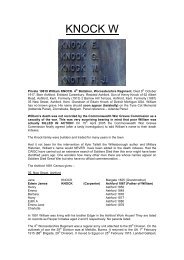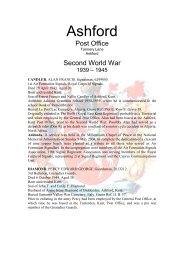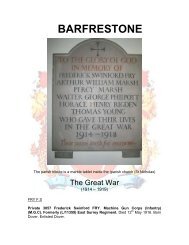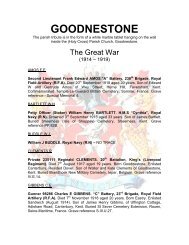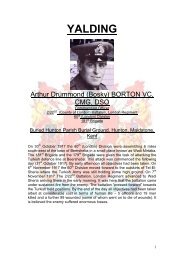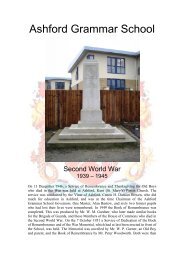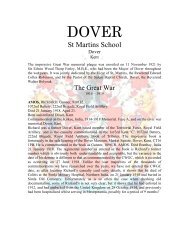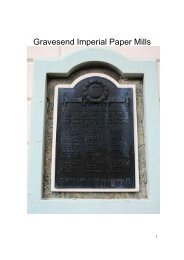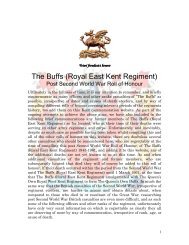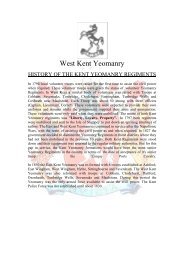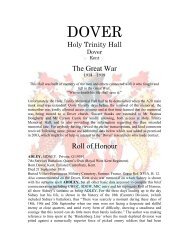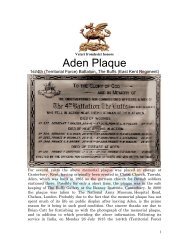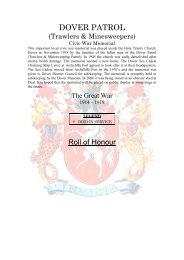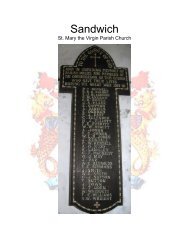batch 2.2 - Kent Fallen
batch 2.2 - Kent Fallen
batch 2.2 - Kent Fallen
You also want an ePaper? Increase the reach of your titles
YUMPU automatically turns print PDFs into web optimized ePapers that Google loves.
David Hughes, Neil Clark, Kyle Tallett<br />
<strong>Kent</strong> War Memorials Transcription Project<br />
http://www.kentfallen.com<br />
Email: clarkneil@hotmail.co.uk<br />
Tuesday, February 05, 2008<br />
Miss. Maria Choules<br />
Records Supervisor<br />
Commonwealth War Graves Commission<br />
2 Marlow Road<br />
MAIDENHEAD<br />
Berkshire<br />
Re: Additional Non-Com Submissions<br />
Private 347 Alfred FLINT. 5 th Buffs (East <strong>Kent</strong> Regiment)<br />
Sergeant T/1050 Albert Arthur BENZ. 5 th Buffs (East <strong>Kent</strong> Regiment)<br />
Thank you for advising me of the MoD (Army) latest adjudications (our Batch 2). The news<br />
cheered us all up no end I can tell you! Proof indeed that this work can be done expediently,<br />
professionally and without the kind of ridiculous delays we have come to expect with all our<br />
non army submissions. The Naval Historical Branch should hang their heads in shame!<br />
We have never had cause to complain about any army adjudication as they all appear fair to<br />
the man and just from a law perspective. Unlike the Naval Historical Branch, whoever does<br />
this excellent work on the army’s behalf quite properly gives the man the benefit of any doubt<br />
when it arises.<br />
To date we have submited 29 cases, 21 of which have now been approved (plus 2 navy<br />
appeals STILL outstanding after 4 years – Hoskins H.F / W.R Page)!<br />
I have attached two further cases which perhaps you would kindly ask the army to look at –<br />
Arthur Flint. In the first instance we deided not to submit this case because the death<br />
certificate gave a cause of death unlikely to have been caused as a consequence of war.<br />
However, looking closer at the case it became apparent that the authorities made an error of<br />
judgment which was eventually overturned after his death. The story is not straightforward<br />
and upon reflection we are now firmly of the opinion that this man does qualify for official war<br />
casualty status and deserves his sacrifice to be commemorated by the country he gave his<br />
life for.
The second submission – Albert Arthur Benz is somewhat more clear cut, he quite obviously<br />
died of wounds received in Mesopotamia a year or so after being evacuated home and<br />
susequently medically discharged.<br />
Would you please kindly acknowledge safe receipt of this letter together with enclosures. It’s<br />
sufficient to send me an email.<br />
Thank you kindly for your valued assitance in these matters.
1. FLINT A<br />
Willesborough War Memorial<br />
Service Papers on CD<br />
Death Certificate on CD<br />
Private 347 Alfred FLINT. 5 th Battalion, The Buffs (East <strong>Kent</strong> Regiment). Formerly 53 rd<br />
(East <strong>Kent</strong> Company) Imperial Yeomanry (Boer War) 1900-1902. Formerly (7878) 1 st<br />
Volunteer Battalion, The Buffs, (East <strong>Kent</strong> Regiment). Died 26 th April 1920 Appendicitis<br />
(blood poisoning) aged 44 years. Husband of Sarah Bessee Martha Flint of 18 Gladstone<br />
Road, Willesborough, Ashford, <strong>Kent</strong>. Brother of L Lewis, 1 Avenue Gardens, Dover, <strong>Kent</strong>.<br />
Buried Ashford (Wilesborough) Cemetery, Church Road, Willesborough, Ashford, <strong>Kent</strong>. Grave<br />
reference unknown at this time (this can be obtained if required).<br />
The cost of Alfred’s funeral was paid for in full by his wife Sarah. Her repeated requests to be<br />
re-imbursed were turned down in the first instance. In 1921 the full costs were finally paid<br />
back by the War Office.<br />
Alfred’s name is NOT recorded as a war casualty by the Commonwealth War Graves<br />
Commission but his name DOES appear on the Willesborough civic war memorial and roll of<br />
honour. His death was widely reported in the local papers which mentioned that his cause of<br />
death was as a consequence of his service during the war.<br />
Alfred served in the Imperial Yeomanry (1 st Volunteer Battalion, The Buffs) from 2 November<br />
1892 until 30 November 1896. He saw extensive service with the Buffs (Volunteers) (Imperial<br />
Yeomanry) during the South African (Boer) War 1899-1902. He was awarded the Queen’s<br />
South Africa Medal with a clasp for Cape Colony and the Kings South Africa Medal with clasp<br />
1899-1902. His service papers confirm he served there from 1900 until January 1902. Alfred<br />
re-enlisted into the Territorial Force (5 th Buffs) in 1908 as a Private soldier. The 5 th Buffs were<br />
based at Ashford’s Drill Hall in Newtown Road.<br />
Prior to the outbreak of war Alfred was employed in the Ashford (SE&CR) Railway Yards as a<br />
Machinist. In his spare-time he served in the Territorial Force at Ashford Drill Hall with his<br />
former regiment (5 th Buffs). He never returned to employment after he was discharged from<br />
the army because of health problems.<br />
On 2 December 1914 Alfred moved to India with the 5 th Buffs. He remained in India until 11<br />
September 1916 when he was sent home unfit for further war service. (total service in India 1<br />
year 180 days). His battalion had moved to Mesopotamia earlier and it appears that when the<br />
battalion moved, Alfred must have still been ill and remained in India being treated in hospital.<br />
When Alfred arrived back in the UK he was discharged unfit for further war service and<br />
awarded a Silver War Badge (SWB) indicating that the authorities recognised that his injuries<br />
or illness at the time of discharge was due to his war service. For some unknown reason<br />
Alfred was NOT awarded an army pension at this time which is surprising given the<br />
circumstances. It is probably that the authorities only credited him with 2 years war service<br />
during the Great War. The fact he served in the Territorial Force for so many years (including<br />
full time service during the Boer War) was not taken into consideration. Obviously this was a<br />
huge mistake because AFTER Alfred had died his wife was awarded a full Widows Pension.<br />
There is good evidence of a complete admin “cock up” because his wife also had to request<br />
his Territorial Efficientcy Medal after he had died!<br />
When Alfred was discharged unfit for further war service he was awarded a Silver War Badge<br />
(SWB) indicating illness or injury as a consequence of war service.<br />
After Alfred died his wife embarked on a tedious campaign to obtain a widows war pension.<br />
She wrote her husband “had been sick ever since he returned from India in 1916”. This<br />
matter was dealt with by the Widows Appeal Section, Ministry of Pensions, Victoria Tower<br />
Gardens, London (evidenced by a letter dated 10 November 1920.
Our first feeling that was the cause of death was not related to his war service. But having<br />
looked closer it became obvious that was not the full story - His wife wrote to the authorities<br />
on countless occasions before going to formal appeal where the decision finally went in her<br />
favour. The Ministry of Pensions eventually over-turned the previous adjudications which<br />
denied her a war widows pension.<br />
It must have been so damn hard for her trying to bring up Alfred’s kids on her own! As if she<br />
hadn’t had enough to contend with losing her husband. It is highly probable that his death<br />
certificate does not give the full cause(s) of death. Alfred’s wife was adament that here<br />
husband was ill ever since he arrived home from India. We think that Alfred deserves his<br />
sacrifice to be recognised by the country he served so gallantly in two conflicts (Boer<br />
War/Great War). He should be given the benefit of any doubt, not that there can be much<br />
doubt because the Ministry of Pensions awarded his wife a widows war pension. It was<br />
notoriously hard to have Ministry of Pensions adjudications overturned therefore the evidence<br />
his wife produced must have been extremely compelling.<br />
Alfred’s service papers record some of his wifes written protestations as well as the final<br />
appeal ruling in her favour.<br />
Letter from Sarah Flint 2 May 1920 to Army<br />
“I received discharge papers quite safe. Sorry to have not written by return but I quite forgot. I<br />
have had such an upset. My husband passed away at the Ashford Cottage Hospital on 26 th<br />
April. He leaves a widow and 4 young children. He has been ill ever since he came home<br />
from India.”<br />
Yours Faithfully<br />
Sarah Flint<br />
This letter clearly infers that Alfred never returned to ful health after he was discharged from<br />
the army.<br />
DEATH CERTIFICATE<br />
Alfred FLINT<br />
Machinist Railway<br />
1. Appendicitis (1.5 months)<br />
2. Faecal Fistula ?<br />
Death registered by his wife – Sarah B.M Flint of 18 Gladstone Road, Willesborough, Ashford,<br />
<strong>Kent</strong>.<br />
__________________________________________________________________________<br />
The 1881 Census –<br />
St John Villas, Cudworth Road, Willesborough, Ashford, <strong>Kent</strong><br />
Alfred FLINT 6 Willesborough 1875<br />
Albert STANLEY 19<br />
Edward 17<br />
Elizabeth 3<br />
Jeremiah 60<br />
Mary A 12<br />
Rose 59<br />
Sarah A 10<br />
Sussanah 15<br />
Thomas 25
After Alfred had died his wife wrote to the Army asking why he had not been awarded the<br />
Territorial Efficiency Medal after 18 years volunteer service. The Army wrote back explaining<br />
that there had been an error due to the outbreak of war in 1914 and that this had resulted in<br />
the medal not being awarded on time! In any event the medal was sent to his widow almost<br />
immediately. At the same time she was awarded a full Widows War Pension by the Minstry of<br />
Pensions. Someone had obviously made a huge mistake by not awarding a Disability Pension<br />
to Alfred when he was discharged from the Army. The same mess up resulted in his Terrorial<br />
Medal not being awarded.<br />
A Flint (53 rd Coy, Imperial Yoemanry) 1901<br />
3 rd Row 3 rd from Left
2. BENZ A.A<br />
Marden War Memorial<br />
Sergeant T/1050 Albert Arthur Benz. 5 th Battalion, The Buffs (East <strong>Kent</strong> Regiment). Died<br />
of wounds 21 st September 1918, aged 31 years. Born Stoke Newington, London 1887. Son of<br />
Sebastian Peter Benz and Mary Ann Benz, née Steel. Albert was seriously injured on 21 st<br />
January 1916, receiving a gunshot wound during an attack on the Turkish lines at Umm-el-<br />
Hanna, Mesopotamia (Iraq). Three weeks later, on 10 th February, he was sent back to India<br />
recover from his injuries, but on 7 th May 1916, having failed to show any improvement, he<br />
was transferred to the Regimental Depot, and returned to England. Place of burial unknown at<br />
this time.<br />
Discharged 20 February 1917 “no longer fit for war service” after serving (pre war) 4 years,<br />
140 days.<br />
His father – a German national who came to England in the 1860s to work as a baker – died<br />
in 1897; his mother remarried the following year, and by 1901 the family were living in the<br />
village of Tenterden in <strong>Kent</strong>, where Albert’s stepfather, James Henry Clarke, worked as a gas<br />
engineer. Albert himself was for some time employed at the Staplehurst Gas Works, and<br />
afterwards worked as a labourer in the nearby village of Marden, where he married Ellen Kate<br />
Preston on 15 th April 1909. Albert and Ellen lived at Howland Road, Marden and 2 Albion<br />
Road, Marden, and had two children – Mabel Louise, who was born in Marden on 7 th June<br />
1910 and baptised in Marden on 14 th August 1910, and Dorothy May, who was born in<br />
Marden on 24 th November 1912 and baptised in Marden on 9 th February 1913.<br />
Soon after moving to <strong>Kent</strong>, Albert enlisted in the county’s Territorial Force, serving with the<br />
1/5 th (The Weald of <strong>Kent</strong>) Battalion of The Buffs (East <strong>Kent</strong> Regiment). He left the regiment at<br />
the end of his initial term of service with the Territorials, but subsequently re-enlisted at<br />
Staplehurst on 1 st November 1912 at the age of 25 years 7 months, rejoining his old Battalion<br />
for a further term of 4 years. Albert attended annual training at Seaford from 27 th July 1913 to<br />
10 th August 1913, and at Longmoor Camp to Salisbury in the summer of 1914. When war was<br />
declared on 4 th August 1914, the 1/5 th Buffs were at the Drill Hall, Ashford, as part of the <strong>Kent</strong><br />
Brigade, Home Counties Division. The following day, Albert was promoted to Lance Corporal.<br />
Over the next few weeks, the Battalion moved to Dover, then to Canterbury, and later to<br />
Sandwich for training. Finally, the 1/5 th Buffs were despatched to India, as replacements for<br />
the regular units that had been recalled to England at the outbreak of the war. The Battalion<br />
sailed from Southampton on 30 th October 1914; on the same day, Albert was promoted to<br />
Corporal.<br />
After arriving in India on 3 rd December 1914, the 1/5 th Buffs were assigned to garrison duty in<br />
Kamptee, near Madras. Albert continued his climb through the ranks; on 8 th March 1915 he<br />
was promoted to Sergeant. At the end of 1915, the 1/5 th Buffs transferred to the Persian Gulf,<br />
where they were to remain for the rest of the war. The Battalion disembarked at Basra on 1 st<br />
December 1915, and joined the expedition to relieve the British forces at Kut, where the 6 th<br />
(Indian) Division was besieged by superior numbers of Turkish troops. However, Albert was<br />
seriously injured on 21 st January 1916, receiving a gunshot wound during an attack on the<br />
Turkish lines at Umm-el-Hanna. Three weeks later, on 10 th February, he was sent back to<br />
India to recover from his injuries, but on 7 th May 1916, having failed to show any<br />
improvement, he was transferred to the Regimental Depot, and returned to England. Albert<br />
was posted on to the 4 th (Reserve) Battalion of the Buffs on 10 th October 1916, and on 20 th<br />
March 1917 he was discharged from the army “in consequence of being no longer physically<br />
fit for war service. He subsequently died of these wounds just over a year later at the age of<br />
31 years.<br />
Albert Benz is commemorated on the War Memorial in Marden, which suggests that the<br />
trustees of the memorial were satisfied that his death was caused by or aggravated by his war<br />
service. However, he does not appear on the Commonwealth War Graves Commission’s<br />
“Debt of Honour Register,” nor is he mentioned in “Soldiers Died in the Great War,”<br />
presumably because he died after being discharged. We believe there is a very strong case<br />
for Albert’s name to be added to the CWGC register.<br />
to



